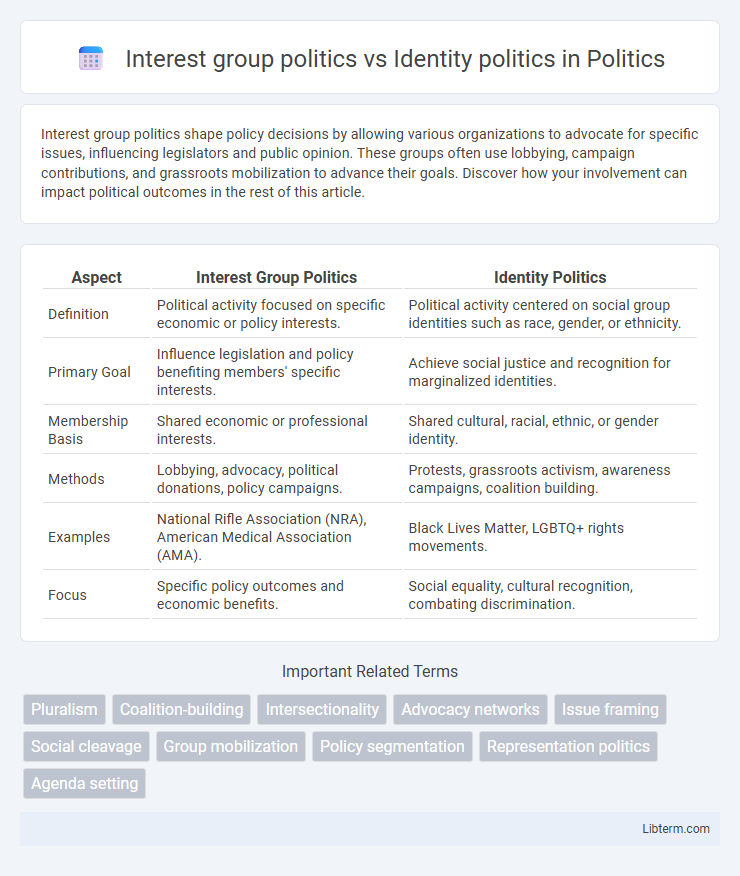Interest group politics shape policy decisions by allowing various organizations to advocate for specific issues, influencing legislators and public opinion. These groups often use lobbying, campaign contributions, and grassroots mobilization to advance their goals. Discover how your involvement can impact political outcomes in the rest of this article.
Table of Comparison
| Aspect | Interest Group Politics | Identity Politics |
|---|---|---|
| Definition | Political activity focused on specific economic or policy interests. | Political activity centered on social group identities such as race, gender, or ethnicity. |
| Primary Goal | Influence legislation and policy benefiting members' specific interests. | Achieve social justice and recognition for marginalized identities. |
| Membership Basis | Shared economic or professional interests. | Shared cultural, racial, ethnic, or gender identity. |
| Methods | Lobbying, advocacy, political donations, policy campaigns. | Protests, grassroots activism, awareness campaigns, coalition building. |
| Examples | National Rifle Association (NRA), American Medical Association (AMA). | Black Lives Matter, LGBTQ+ rights movements. |
| Focus | Specific policy outcomes and economic benefits. | Social equality, cultural recognition, combating discrimination. |
Understanding Interest Group Politics
Interest group politics centers on organized groups that influence public policy to benefit their members through lobbying, advocacy, and coalition-building. These groups operate within political institutions to promote specific economic, cultural, or social interests, often leveraging resources and expert knowledge. Understanding interest group politics involves analyzing their strategies, influence on legislation, and role in shaping democratic governance and policy outcomes.
Defining Identity Politics
Identity politics centers on groups formed around shared characteristics such as race, gender, ethnicity, or sexual orientation, emphasizing the experiences and rights of marginalized communities. This political approach seeks to address systemic inequalities by advocating for recognition, representation, and policy changes specific to these identities. Unlike interest group politics, which prioritize economic or policy interests, identity politics foregrounds social and cultural dimensions of group membership.
Historical Evolution of Both Concepts
Interest group politics originated in the late 19th and early 20th centuries as organized efforts by economic, social, and professional groups to influence public policy through lobbying and advocacy. Identity politics emerged more prominently in the mid-20th century, gaining momentum from the Civil Rights Movement, feminist struggles, and LGBTQ+ activism, emphasizing the political interests of marginalized social groups based on race, gender, sexuality, and other identity markers. Both concepts evolved in response to changing social dynamics, with interest groups prioritizing institutional influence while identity politics focused on recognition and empowerment of historically oppressed communities.
Key Players and Stakeholders
Interest group politics centers on organizations like trade unions, business associations, and lobby groups that advocate for specific economic or sectoral interests. Identity politics involves social groups defined by race, gender, ethnicity, or sexual orientation, with stakeholders including civil rights organizations, advocacy groups, and community leaders. Key players in interest group politics often influence policy through direct lobbying and campaign contributions, while identity politics stakeholders mobilize grassroots activism and cultural advocacy to shape public discourse.
Methods of Advocacy and Mobilization
Interest group politics relies on formal lobbying, campaign contributions, and policy research to influence legislators and shape public policy through organized, issue-specific coalitions. Identity politics mobilizes communities based on shared social, cultural, or experiential characteristics, using grassroots organizing, protests, and social media campaigns to build solidarity and demand systemic change. Both approaches differ in their advocacy methods: interest groups employ targeted institutional access, while identity politics harness collective identity to generate widespread public pressure.
Impact on Policy Making
Interest group politics often shape policy making through organized lobbying efforts and targeted advocacy, driving legislation that benefits specific economic, professional, or sectoral interests. Identity politics influences policy by mobilizing social movements and demanding recognition and rights for marginalized communities, reshaping agendas around civil rights, equity, and cultural issues. Both forms of politics affect policy outcomes, but interest groups typically leverage institutional connections while identity politics relies on grassroots activism and public pressure to influence decisions.
Overlapping Agendas and Conflicts
Interest group politics and identity politics often overlap through shared goals such as policy reform, social justice, and economic equality, enabling coalitions to amplify their influence on legislation and public opinion. Conflicts arise when interest groups prioritize specific issues tied to economic or sector-based concerns, while identity politics emphasize lived experiences and cultural recognition, creating tensions over resource allocation and strategic approaches. Navigating these overlaps and conflicts requires balancing broad-based advocacy with nuanced identity representation, ensuring both economic interests and social identities are effectively addressed in political discourse.
Influence on Electoral Outcomes
Interest group politics primarily influence electoral outcomes through lobbying efforts, campaign contributions, and mobilizing specific voter bases to support candidates aligning with their policy goals. Identity politics shapes elections by galvanizing voting blocs around shared social, cultural, or demographic identities, which can lead to increased voter turnout and candidate support within those groups. Both strategies significantly impact candidate platforms and election results by targeting different mechanisms of political engagement and voter persuasion.
Critiques and Controversies
Interest group politics often faces criticism for prioritizing narrow economic or organizational interests, leading to unequal representation and policy outcomes favoring well-funded groups, while potentially marginalizing broader public concerns. Identity politics, on the other hand, is critiqued for emphasizing group-based differences, which some argue can foster polarization and undermine social cohesion by prioritizing identity over common interests. Both approaches generate controversy over their influence on democratic processes, with debates centering on whether they enhance political inclusion or contribute to fragmentation and exclusion.
Future Trends in Political Participation
Interest group politics will increasingly leverage digital platforms and data analytics to mobilize niche constituencies and influence policy-making through targeted advocacy campaigns. Identity politics is expected to evolve with greater intersectionality and virtual community building, enabling marginalized groups to amplify their voices and shape political discourse globally. Future political participation trends emphasize hybrid engagement models that combine traditional lobbying with online activism, reshaping power dynamics between interest groups and identity-based movements.
Interest group politics Infographic

 libterm.com
libterm.com